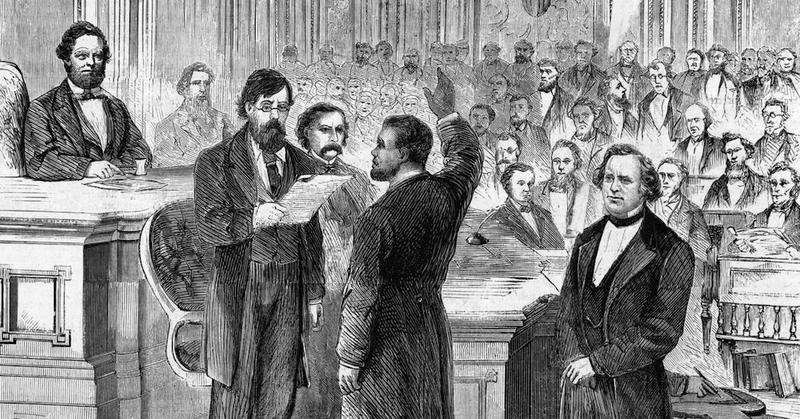Hiram Rhodes Revels: The First Black Congressman
By | February 18, 2020

This Black History Month, we'd be remiss to overlook incredible life of Hiram Rhodes Revels, who was sworn into the U.S. Senate on February 25, 1870, just five years after the end of the Civil War. Revels was truly a man ahead of his time: He was not only America's first African-American congressman but also a Methodist minister, college administrator, and a chaplain for the United States Colored Troops fighting in the Civil War. Just how did Revels break Congress's color barrier? To answer that question, we must take another look at America's Reconstruction era.

The Reconstruction Era And Racial Equality
The decades leading up to the American Civil War (and the war itself) were marked by terrible racial inequality in the United States. Slavery was a common practice in the southern states, and the slave trade was a thriving industry. After Lincoln's Emancipation Proclamation and the Union victory in the Civil War, however, the real work began. The early years of Reconstruction saw the passage of several key laws that were designed to turn the country into an interracial democracy, and for a time, it looked like tremendous progress in racial equality was being made. Sadly, it didn't last long. Within a few years, it became clear that the laws granting rights for all were meaningless gestures as more laws were passed to further erode the rights of racial minorities in the U.S.

Hiram R. Revels's Window Of Opportunity
Hiram Rhodes Revels's election to Congress occurred during the small window of time when it seemed that the United States was making real progress on the road to total racial equality. With slavery a thing of the past but before the passage of the first Jim Crow laws in 1877, the time was ripe for a man like Revels to make his mark. Had he run for a seat in Congress prior to 1865 or after the mid-1870s, his campaign likely would have been dismissed.

Hiram Rhodes Revels: The Early Years
Although Revels was born in Fayetteville, North Carolina on September 27, 1827 during the time of slavery, he was never a slave. His family had been freed from slavery a few years before the Revolutionary War, so he and his brother were born free men. When he was just 11 years old, Revels was sent to live with his brother, Elias B. Revels, to work as an apprentice in Elias's Lincolnton, North Carolina barber shop. When Elias died, Hiram inherited the barber shop, and owning his own business provided Revels the status that enabled him to network with people of all racial and social classes.

Seeking An Education
In his youth, Hiram Rhodes Revels was tutored at home by a local woman, but as a young man, he sought higher education opportunities. He attended the Union Literary Institute in Indiana, which was founded by Quakers and welcomed all students. After his time at the Institute, Revels studied religion at Drake County Seminary in Ohio and Knox College in Galesburg, Illinois.

A Methodist Episcopal Minister
Not content to simply be a scholar and barber, Hiram Rhodes Revels became a minister. While serving at the Methodist Episcopal Church in Baltimore, Revels also taught school and eventually became the principal of an all-black high school in Maryland. His experience as an educator would help him later in life.

Hiram R. Revels And The Civil War
When the Civil War broke out, Hiram Rhodes Revels stepped up to help the Union cause. He organized two Union regiments of African-American soldiers and even recruited men to join the army. Serving as a chaplain, he was sent with his troops to Mississippi, where they fought in the Battle of Vicksburg. When the war ended, Revels stayed in Mississippi and resumed work as a minister.

That Groundbreaking Election To U.S. Congress
During Revels's time, U.S. congressmen were elected by state legislature, not by popular vote. Members of the Mississippi State Senate voted 81–15 to send Hiram R. Revels to Washington, D.C. to fill a vacant Senate seat in 1870, but when he arrived in the nation's capital to take his new position, he ran into some trouble. Southern Democrats opposed his addition to the Senate and initiated two days of well-publicized debates, finally ending when Charles Sumner, a Republican senator from Massachusetts, declared "Nothing more needs to be said. For a long time, it has been clear that colored persons must be senators." On February 25, 1870, Hiram Rhodes Revels was voted into the U.S. Senate by a vote of 48–8 to become the first African-American seated in the Senate.

Revels's Term as Senator
Hiram Rhodes Revels's term in the Senate lasted only one year, but during that time, he advocated for racial equality and compromise, speaking out against segregation in the nation's schools and the military. At this time, much of the work of Congress was focused on Reconstruction efforts, and Revels advocated for forgiveness for ex-Confederates and the full restoration of their citizenship. Revels also served on the Committee of Education and Labor.

Revels's Post-Political Career
Hiram R. Revels voluntarily gave up his Senate seat to accept the position of president of Alcorn Agricultural and Mechanical College in Mississippi, which later became Alcorn State University. In addition to serving as the college's president, Revels taught philosophy at the historically black school. Although he felt that the work he was doing in the Senate was important, working in education allowed him to more directly enhance opportunities for young African-Americans. He also continued to work as a minister for the Methodist Church. He was attending a meeting of Methodist ministers on January 16, 1901 when he died, possibly of a heart attack, but Hiram Rhodes Revels will forever be remembered as the first African-American senator.

